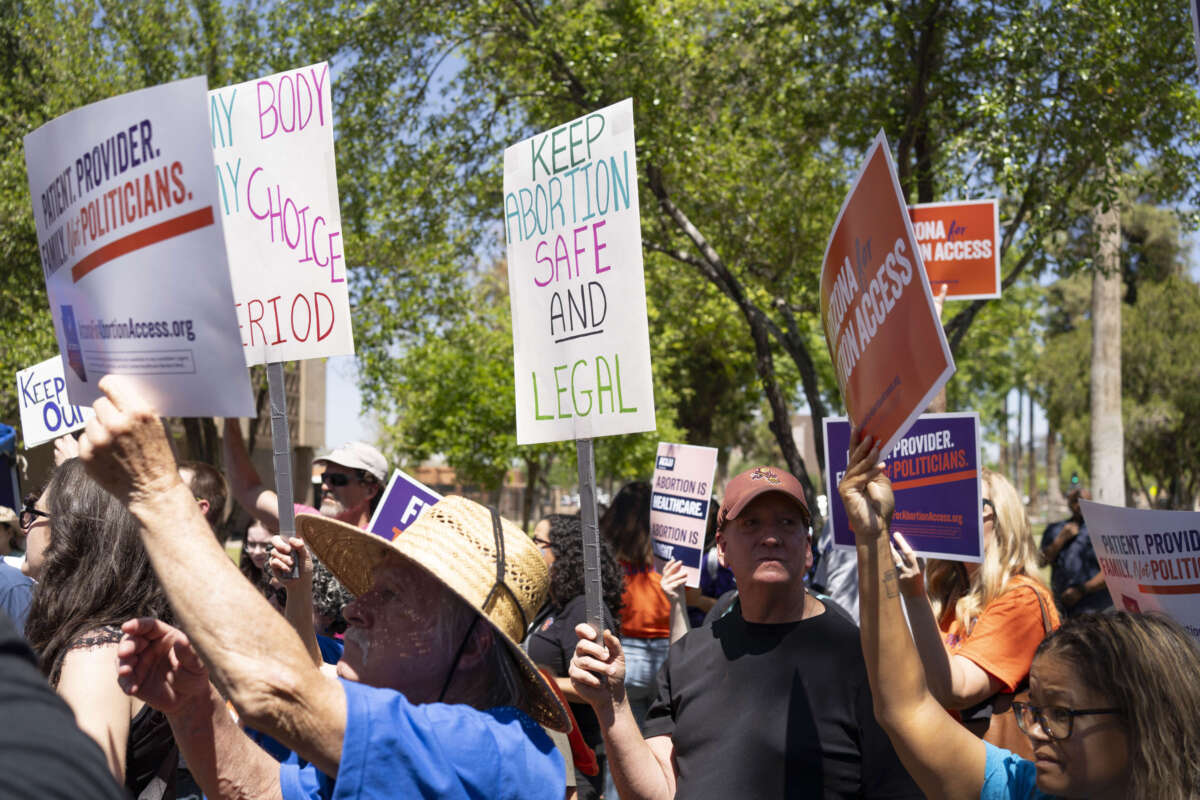Support justice-driven, accurate and transparent news — make a quick donation to Truthout today!
An abortion rights initiative will officially be on the ballot in the state of Arizona this November.
On Monday, the Arizona Secretary of State’s office certified enough signatures to formally place the amendment proposal on the ballot, following the successful collection of enough signatures across the state to do so.
Currently in Arizona, a 15-week abortion ban is in place, barring the procedure after that time in a pregnancy except to save the life of a pregnant person — a standard that is not always followed as well as it should be, evidenced by other states’ actions in recent years. Even within that 15-week period, several restrictions on abortion exist, including requiring those seeking the procedure to undergo unnecessary and invasive ultrasounds before obtaining an abortion.
Critics noted that the 15-week ban could easily be replaced by the state legislature in the future, which only passed the measure earlier this year after an 1864 territorial statute banning abortion at all gestational stages was reinstated by the state Supreme Court.
The proposed amendment, which is now known as Proposition 139, would end those restrictions and extend a “fundamental right” to abortion up to the point of “fetal viability” as understood by a physician treating their patient — generally understood to be around 22-25 weeks of pregnancy. The state could enact restrictions beyond that time, but no law could restrict a person from having an abortion, at any stage, if their life or health was at risk due to their pregnancy.
Arizona for Abortion Access, a coalition of groups dedicated to enshrining abortion rights in the state constitution, collected hundreds of thousands of signatures in support of the amendment. The Secretary of State’s office certified 577,971 of the signatures that were gathered, far beyond the required 383,923 that the group had to obtain to get the measure on the ballot.
According to the group, the number of signatures that were certified is the highest ever in Arizona history.
“Thousands of local volunteers and dozens of organizations focused on reproductive rights, healthcare, faith communities, and veterans rights, not to mention millions of Arizonans have been looking forward to this day for more than a year,” said Chris Love, a spokesperson for Arizona for Abortion Access.
“This is a huge win for Arizona voters who will now get to vote YES on restoring and protecting the right to access abortion care, free from political interference, once and for all,” said Arizona for Abortion Access campaign manager Cheryl Bruce.
The Arizona Secretary of State’s office has acknowledged that lawsuits may come about from the approval of the ballot measure. However, challenges from anti-abortion groups have thus far been unsuccessful, with one such lawsuit being dismissed earlier this month.
That challenge asserted that the wording of the amendment and its accompanying explainer were too confusing for voters. Maricopa County Superior Court Judge Melissa Iyer Julian dismissed those concerns, stating that the “description [of the amendment] accurately and fully communicated the initiative’s key provisions.”
“This Court will not order its removal from the general statewide election ballot,” Julian added.
Polling within the state suggests the ballot measure has a good chance of passing. A CBS News poll from May, for example, found that 65 percent of Arizona voters would support a ballot measure making abortion a constitutional right in the state, with only 21 percent saying they’d oppose such a proposal.
Arizona is now the seventh state in the U.S. to have an abortion measure featured on its ballot in the general election this fall. Residents in four other states are also either in the process of certifying a ballot measure or seeking to attain ballot access. Since the overturning of Roe v. Wade by the U.S. Supreme Court, the restoration and expansion of abortion and reproductive rights has become a rallying cry for Democrats, with ballot initiatives already passing in several states, and pro-abortion Democratic candidates winning in a number of key races across the country.
Media that fights fascism
Truthout is funded almost entirely by readers — that’s why we can speak truth to power and cut against the mainstream narrative. But independent journalists at Truthout face mounting political repression under Trump.
We rely on your support to survive McCarthyist censorship. Please make a tax-deductible one-time or monthly donation.
